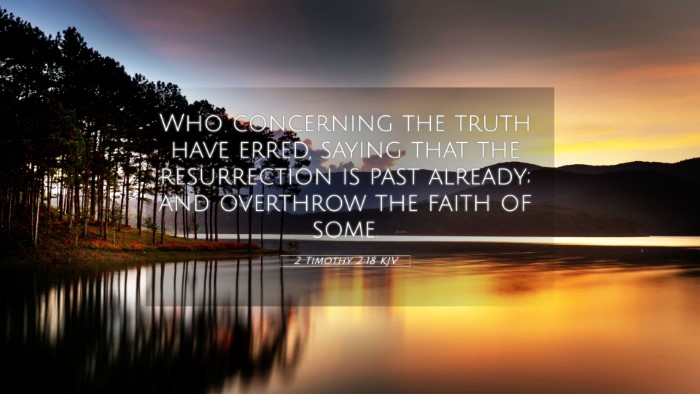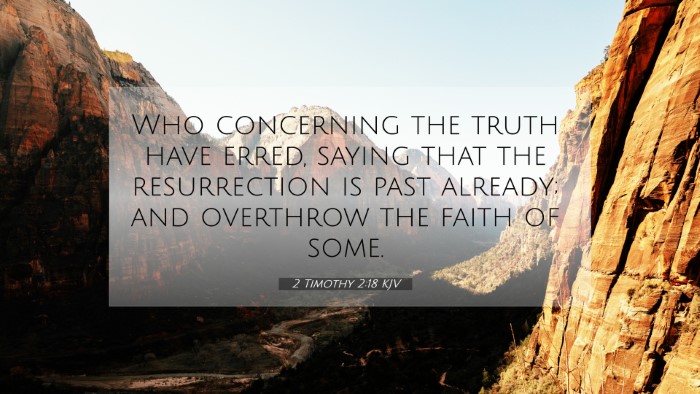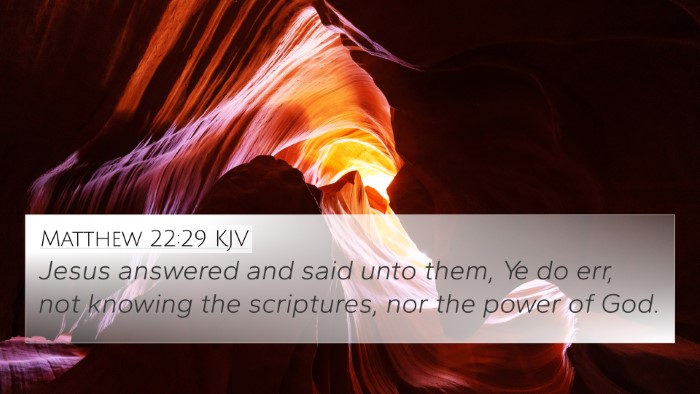Understanding 2 Timothy 2:18
Verse: “Who concerning the truth have erred, saying that the resurrection is past already; and overthrow the faith of some.” - 2 Timothy 2:18
Overview
This verse is part of Paul's letter to Timothy, where he addresses the challenges faced by the early church. Scholars highlight the dangers posed by false teachings, particularly regarding foundational truths like the resurrection of Christ. Timothy’s task involves safeguarding the integrity of the Gospel against deceptive doctrines.
Commentary Insights
-
Matthew Henry:
Henry explains that those who claimed the resurrection had already occurred were misleading believers, causing confusion and uncertainty. This misinterpretation destabilized the faith of some, leading them away from the assurance of future resurrection promised in Christ. Henry suggests that the truth of the Gospel must be upheld to prevent such spiritual derailment.
-
Albert Barnes:
Barnes notes that the spread of this heretical view of the resurrection not only misrepresented the doctrine but also sowed seeds of doubt among the congregants. He emphasizes that this serves as a reminder to discern teaching closely and adhere to the authentic Gospel message, which remains a linchpin for Christian hope.
-
Adam Clarke:
Clarke identifies the individuals mentioned as potentially being leaders who had fallen into error regarding this key doctrine. He stresses the importance of maintaining sound doctrine, reflecting on how misbelief in vital truths like resurrection impacts the entire body of believers. Clarke also draws attention to the necessity for vigilance against false teachings in the church.
Biblical Cross-References
2 Timothy 2:18 relates to several other scripture passages, highlighting its significance within the context of biblical teaching:
- 1 Corinthians 15:12-22: Discusses the fundamental nature of the resurrection of Christ and its implications for believers.
- 2 Peter 2:1-3: Warns about false teachers who bring destructive heresies and how they exploit believers.
- Titus 1:10-11: Addresses the necessity of silencing deceptive individuals who lead others astray.
- Romans 16:17-18: Encourages believers to be aware of divisions and obstacles created by those who do not adhere to sound teaching.
- Ephesians 4:14: Speaks about maturity in faith and the importance of not being swayed by every wind of doctrine.
- Matthew 24:24: Jesus warns against false prophets and Christ impersonators who can deceive even the elect.
- 1 Thessalonians 4:13-18: Paul reassures believers about the second coming and the resurrection of the dead in Christ.
Thematic Connections
The themes surrounding 2 Timothy 2:18 are crucial for understanding the importance of doctrinal integrity:
- The Resurrection: Central to the Christian faith, misunderstood teachings about the resurrection can lead to widespread misconception.
- False Teachings: The early church faced severe challenges from misguided doctrine, necessitating Paul's protective exhortations.
- Faith Stability: The faith of believers is deeply affected by the teachings they accept; hence, there is a vital need for discernment.
Practical Applications
This verse and its commentary provide several practical insights for today's believers:
- Guard Against Deception: Believers are encouraged to study scripture diligently and be aware of the truth versus error.
- Engage in Sound Doctrine: Regular teaching and participation in sound doctrinal settings foster spiritual growth and resilience.
- Support and Strengthen Others: Just as false teachings affected the faith of some, believers should actively support each other in truth.
Conclusion
2 Timothy 2:18 serves as a poignant reminder of the importance of adhering to the truth of scripture. By understanding cross-references and connecting various biblical themes, believers can better navigate the complexities of faith and doctrine. As we explore these insights, we are equipped to defend our faith and contribute to the edification of the church.

















